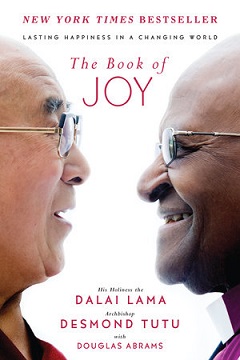Do you experience days when you don’t want to watch TV, read newspapers, or go online because you are afraid that you would be assaulted by bad news which you feel you have had enough and don’t want any more of it or at least you want a respite from it?
I had that feeling the past days and I found comfort in “The Book of Joy” a conversation between two revered personalities, The Dalai Lama, Tenzin Gyatso and the Archbishop Emeritus of Southern Africa Desmond Tutu assisted by writer Douglas Abrams.

The book exudes a light hearted feeling. Yet the conversation is profound.
Archbishop Tutu: “We are fragile creatures, and it is from this weakness, not despite it, that we discover the possibility of true joy.
He stressed the difference between Joy and Happiness: “Joy is much bigger than happiness. While happiness is often seen as being dependent on external circumstances, joy is not.”
I’m sharing snippets from the book that I find relevant to the environment we live today.
They talked about fear, stress and anxiety.
Archbishop Tutu: “We all have fears. Fear and anxiety are mechanisms that have helped us to survive. You know, if you did not feel fear when you saw a lion over there and you just walked merrily by, in next to no time, there would be no you. God has given us these things because God knew that we needed them. Otherwise, we would be fearless, but then we’d also be very stupid, and we would be fearless, but then we’d also be very stupid, and we would not be around very long. The problem is when the fear is exaggerated or when it is provoked by something that is really quite insignificant.”
“The problem is not the existence of stressors, which cannot be avoided; stress is simply the brain’s way of signalling that something is important. The problem –or perhaps the opportunity- is how we respond to this stress.”
The following is from the chapter ”You are a masterpiece in the making”:
“Through self-inquiry and meditation, we can discover the nature of our mind and learn to soothe our emotional reactivity. This will leave us less vulnerable to the destructive emotions and thought patterns that cause us so much suffering. This is the process of developing mental immunity.
“The Archbishop was simply reminding us that even with this immunity, there will be times when we will have negative or destructive emotions, and when this does happen, the last thing we want to do is judge ourselves harshly…..
“The first step is to accept the reality of suffering…
“Dukkha (Sanskrit) can be translated as ‘stress,’ ‘anxiety,’ ‘suffering,’ or ‘dissatisfaction.’ It is often described as the mental and mental suffering that occurs in life, illness, and ageing. It is also described as the stress and anxiety that arise from the attempt to control what is fundamentally impermanent and unable to be controlled. We try to control the moment, which results in our feeling that what was happening should not be happening. So much of what causes heartache is our wanting things to be different than they are. ‘I think in many cases,’ the Dalai Lama explained, ‘you develop some sort of unhappiness, some discontent, which leads to frustration and anger.’
“While stress and frustration may sound like superficial problems or complaints, the Buddha identified them as the core of so much of our unnecessary, or created, suffering. I was reminded of what the Dalai Lama had said on our first day: We cannot end natural disasters or the suffering they cause, but so much of the rest of our suffering we can….
“We get very angry with ourselves. We think we ought to be supermen and superwomen from the start…
“Accepting circumstances as they are, because if there are circumstances that you cannot change, then it’s no use beating your head against a brick wall; that gives you headache. This is a vale of growth and development….
“Indeed we can use our tears, our stress and frustration, as well from which we can draw the life-giving waters of our emotional and spiritual growth.
“The Archbishop said as he concluded our discussion….”And so I would say to everyone. You are made of perfection, but you are not yet perfect. You are a masterpiece in the making.”
